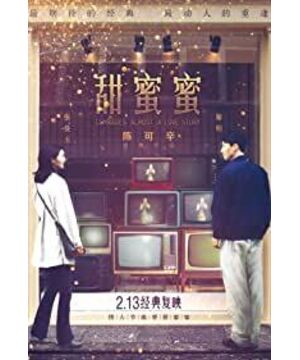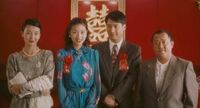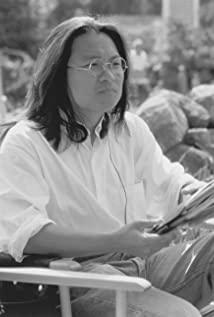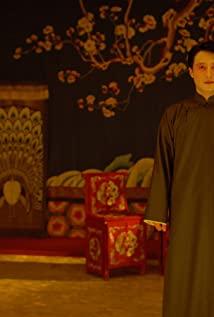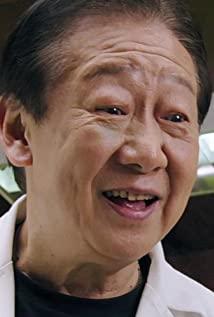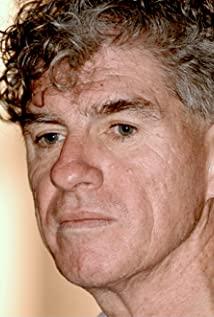"Sweet Honey" is such a movie: since I met it in 1999, for more than ten years since then, I have been consciously or unintentionally looking for the opportunity to say goodbye to it. It's pretty much the movie I've seen the most so far.
My love for it never diminishes as I become more familiar with it. Those familiar bridges and lines can still arouse my strong emotions every time. I don't know why it stuck with me so lastingly, the only reason I can explain it is that it's my favorite kind of movie.
I later found this passage in Roger Ebert's Great Movies: "Many of the movies listed in this book I have seen a dozen times, of which forty-seven I have I studied it shot by shot... I couldn't help but think of the British film critic Derek Malcolm who once selected a group of similar classic films. He said that the only criterion for his selection was to think about the future It is unbearable not to see these films.”
This quote inspired me, and "Sweet Honey" is certainly one of those movies that I "can't stand the thought of never seeing it again". I still remember in 2012, I had a chat with a friend I met for the first time at a Starbucks in Central, Hong Kong, and we were reminiscing about the lines from "Sweet Honey" -- it was a crazy and charming moment.
Personally, in the more than ten years from the end of the 20th century to the beginning of the 21st century, the provinces and cities where I worked and lived went through Shandong, Shanghai, Beijing, Hong Kong, and finally returned to Beijing. Lived in each city for at least two years, and over seven years in Shanghai and Beijing. I've seen this movie more than once in each of the above places (except Shandong, which was the last movie I watched when I left Shandong). Apart from being deeply moved by the boundless feelings of love, fate and life encounters in Chen Kexin's films, my life in different cities has also enabled me to see clearly at a glance, and understand Li Xiaojun and Li Qiao in a life-to-life manner.
Just like when Tolstoy finished writing "Anna Karenina", many readers thought that Anna Karenina was themselves, the story in "Sweet Honey" is only realistic, and I think many people must recognize it directly Li Xiaojun and Li Qiao inside are also themselves, right? ──After all, the last twenty years in China are simply a history of migration.
All young people, except for the indigenous people in big cities like Beijing, Shanghai, and Guangzhou, a large number of others live and work in other places. , buying a house, repaying a loan, falling out of love, getting married... a Hong Kong legend of mainlanders, which later became the common life of almost all mainland young people. The paradox of the world is so unexpected. The development is surprising, and it also produces loss.
Director Chen Kexin himself is a "Hong Kong director" with an impure identity background. He himself was born in Hong Kong, his parents are overseas Chinese in Thailand, and his father, Chen Tongmin, is a director and screenwriter, and he is not very ambitious. Hong Kong has always been xenophobic. Perhaps Chen Kexin faced the question of "where am I from?" in his childhood.
When he was eleven, they returned to Thailand again. After he finished college in the United States, he experienced a few years of working in a film company in Hong Kong. In 1991, Chen Kexin's first film was "A Tale of Two Cities" starring Zeng Zhiwei, Maggie Cheung and Alan Tam. Obviously, this is a drifting story.
This is the first flower of the Stranger's restless gene.
As such a film director who "recognizes that a foreign country is his hometown", after 2000, Chen Kexin came to the mainland to make films. It can be seen from the subject matter of his film selection that he does seem to want to live and spiritually more than any foreign director. Double level, blending into a world unfamiliar to him. This can be seen from his early filming of "Martial Arts" and "Certificate of Fame", to his later filming of "Chinese Partner" and "Dear", which are closely related to the reality of the mainland and which even mainland directors dare not face directly. It can be said that Li Xiaojun and Li Qiao, who struggled in a foreign land in "Sweet Honey", also have his shadow in essence. So he can shoot such a delicate and long-lasting taste.
This "Sweet Honey", which won nine awards at the Hong Kong Film Awards that year, was actually filmed in 1995. The screenwriter Kishi Nishi is a famous screenwriter who has literary taste, loves reading mystery novels, and is unwilling to think about love as simple as the relationship between men and women in "Titanic", and rarely reads romance novels. But she was not yet famous. It is said that when she was conceiving the script of "Sweet Honey", the character of the protagonist was not yet clear, but the death of Teresa Teng has been reported and touched her. She decided to write this love story.
In 1995, it was also two years before the return of Hong Kong. From March 1, 1986, when the film begins, to May 8, 1995, when the film ends, it spans nearly ten years. This is also the last years when Hong Kong was a British colony. Hong Kong people experienced major events such as panic before the handover and the stock market crash. There is a sentence in the film: "Xiao Ting, it is said that the summer in Beijing is very hot this year, and people are too hot", which is also said to allude to a political event in the mainland. However, when I watched the movie, I couldn't feel it at all, and it could only be regarded as a guess.
The protagonists in the play, including the supporting ones, all look like real people in our lives. Li Xiaojun and Li Qiao, one is a young man from Wuxi (also in Tianjin in the earliest version) who went to work in Hong Kong but cheated. He is a little honest and ignorant. Even if there is "sex", Li Qiao's conclusion is nothing more than "the wind and the rain are heavy, two lonely people just had a New Year's dinner in a daze".
It can be said without hesitation that it is very worrying for such a character to be the protagonist of a love movie. They are a bit like Fan Liuyuan and Bai Liusu in "Love in a Fallen City". They are the encounter of two ordinary people with many problems in the context of the big era. The movie would have been a disaster if it weren't for the superb brushwork of these two men's versatility, and their forgivable genes.
What's more, from the clues revealed by the movie's English name "Comrades: Almost a Love Story" (literally translated as "Comrades in Arms: Almost a Love Story"), we can also find that this is probably not a pure love movie. The fact is also true, although the Chinese title of "Sweet Honey" is very "soft and sweet", the content is more desolate.
We're all "comrades-in-arms" in life -- there's very little "sweetness" in this film. The laws, patterns and norms of love that we usually see in ordinary love movies, those elements that constitute what we usually think of as "sweet" love, such as belief and persistence in "love", and emphasis on "sex" , the whipping of derailment, the shaping of "negative characters" who interfere with love... This is not the case in this movie.
Its perspective of looking at problems and caring for the hearts of ordinary people can easily make those who have a strong sense of morality, standards of good and evil, and the distinction between good and bad people change their existing outlook on life, world outlook and values. Such a vision was not only advanced in the late 20th century at the time, it is still not outdated even today. The movie looks at the protagonist with a very flat, rather than contemptuous, or arbitrary eye, and it never puts its own point of view above the protagonist's feelings. In other words, it's the kind of compassion that the best works of art have, it's both indulgent and detached, intimate and alienating, passionate and ruthless, it shows us the weakness of human nature, the strength of the environment, The unpredictability of the world.
"Heaven and earth are not benevolent, and all things are dogs." In the process of watching the movie, all of us are floating like the protagonist—in fact, it is the same when we leave the theater. Therefore, I still think that "Sweet Honey" deserves to be ranked in the top three among the scripts of excellent Chinese love movies in the past two decades. Even if it is the first, it is not surprising.
At the same time, just like Marquez's "Love in the Time of Cholera" said that he wrote all kinds of love, it is the culmination of love, "Sweet Honey" also presents a multi-line, complex, colorful, multi-dimensional kind of love.
Li Xiaojun and Xiaoting's simple love, Li Xiaojun and Li Qiao's complex and desolate love, Li Qiao and Leopard brother's love in adversity, aunt Rosie's fantasy and cruel love for William, Zhai Luwei's inconvenience after Kailan got AIDS. Abandoned love... The manifestations of all kinds of love are facilitated by various karma. Here, the depth of those loves is not only manifested in the ignorance of life, the attraction of sex, the support of morality, and the collapse of traditional concepts, but they also show the power of the times and the power of the unknown.
This makes their love appear not just romantic, but also has a heavy texture - which also makes all the "love words" in the movie actually "jing words". They are a chorus, but some people are at the front desk, some people take a glimpse, and some people walk by the side of the road.
Aunt Rosie, who has a sense of the times and seems to live in memory as soon as she appears, is the first character in "Sweet Honey" to appear with the element of "love". However, from the beginning to the end, her love is in a frozen state, and she warms it with a warm heart from time to time. In the photos shown in the film, she was a beautiful woman in her youth, and she lived a very unbearable life in her later years, even living with prostitutes, forming a cruel contrast.
And, when she first talked to Li Xiaojun about William Holden, we already sympathized with her. She put William Holden's clothes on for Li Xiaojun, looked at the photos on the wall with a smile, looked at Li Xiaojun again, and said to him, "One day he will come back and ask me to get (clothes)." It seemed that she suddenly discovered What, said to Li Xiaojun: "You are a bit like him." Li Xiaojun asked with a smile, "Uncle?" Immediately, Li Xiaojun's perfect and elegant Chinese face was reflected in the mirror, but it was nothing like William Holden.
Although this conversation is short, the infatuation is long, and it almost goes through the years. Even Li Xiaojun called him "uncle". These are two ridiculous words. Only the two aunts and nephews, who are infatuated and honest, take the fake as the real thing (isn't Li Xiaojun's feelings for Li Qiao not the same at the beginning?). For William Holden, maybe it was just a "one night stand". This kind of love ends when it started. Only Rosie is still obsessed with it. Either she deliberately wanted to live in a dream because of the difficulties in her life, or it was because she fell in love at first sight, so after decades, she had to look for "shadows of lovers" in irrelevant Chinese people.
After Li Xiaojun got married, he came to see his aunt in the old house. Rosie's body was already very bad, and even her dog was "dazzling". In the same short shot, Rosie recalled William again with infinite fascination: "When I met him, he was filming "Life and Death" in Hong Kong. One day I made a special trip to the Old Peak Hospital to see him filming. Later, he invite me to the peninsula for dinner...the first time in my life I went to the peninsula..."
The last time, it was after Li Xiaojun showed off his relationship with Li Qiao with Xiaoting, and before Li Xiaojun went to the United States, when he came to find his aunt, but Rosie had passed away. A very low shot of her hands hanging down by the bed while her dog sniffs, as if to wake her up. At this time, Li Xiaojun pushed the door and came in. Such lens language is very hierarchical and advanced, a lens language that can only be understood.
Lonely, a woman who died with the love she could not get; Lonely, an old dog; Lonely, Li Xiaojun, who just lost her marriage and love. They meet at this time.
"My valuables are in this box all my life. My happiest day was when William took me to the peninsula for dinner. I stole our used knives, forks, cups and saucers while he didn't know it, and now I occasionally take them out to look at them. Still happy. Maybe William doesn't remember me for a long time. But it doesn't matter, I remember. Now I'm so old and ugly. It's a good thing he doesn't come to me."
The camera shows the things that are treasures to Rosie one by one. After decades, those things are obsolete, but they seem to be able to precipitate the texture of the years. Aunt Rosie's love is also piled up on objects that are not worth much, such as her love that is worthless to outsiders, but it is priceless to her. Rosie's will also shows that she is actually very conscious of this love, but does not want to wake up from it. It's like the kind of love in Zweig's "Letter from a Strange Woman"—I love you is mine, not yours. This is also the weakness of human nature. It is an irreversible self-anaesthesia.
The movie shows people's fragility well, people's dreams, the kind of firmness and calmness that even though they know it's unrequited love, they still go forward and deceive themselves. It's the greatest bodhisattva mind for this type of person or this type of feeling -- actually every one of us is a Rosie at some point, to some extent.
I remember watching Lin Taiyi (Lin Yutang's daughter) recall how he and William Holden had lunch at the Eagle's Nest, how he dressed up deliberately, but his face was crooked and vomited, which was a terrible sight. This is exactly the same as Li Xiaojun's aunt Rosie's fascination with William Holden. This also paints the film with a layer of quasi-real temperament. It makes the whole tone of "Sweet Honey" feel historical, not by rigid historical facts, but by the experiencers in the historical facts.
Similarly, the thick and occasionally interspersed strokes about Teresa Teng also shrouded the "real" shadow of the whole work. It can be said that in the history of film, many films have the way of making virtual characters and real characters meet in the works, but few of them are as fresh, natural, romantic and finishing touches as "Sweet Honey".
"Sweet Honey" does not use Teresa Teng and her songs as a gimmick, but makes it organically integrated with the characters' feelings and storyline.
At the same time, the appearance of this legend and her songs, her several different songs "Sweet Honey", "Small Rain of Tears", "Goodbye, My Love" and "The Moon Represents My Heart" make the whole work full of A lingering and sad tone. Her abrupt end, and even led to the goodbye of Li Xiaojun and Li Qiao at the end, this is an equally impossible legend, but it is full of sadness and sweet poetry.
When Li Xiaojun was cutting her hair in the barbershop, when Li Qiao walked through the streets of New York with the sound of the radio, and finally stopped in front of the shop window on the side of the road, her eyes were watching the black and white TV on the TV. It's a thing of the past, and our audience knows that she must have thought of the rainy night when she and Li Xiaojun sold Teresa Teng cassettes in Hong Kong and eventually lost money, and how Li Xiaojun lay with her on the hotel bed and hummed "Sweet Honey" to her. , there were also chicken feet "filling the shape with the shape" on the table; she must also remember how they met Teresa Teng, Li Xiaojun crossed the road excitedly and asked her to sign the back of the clothes, and then they went back to How to continue the front line, but finally on the same day, because of the Leopard Brother incident, they parted ways again...
Songs and characters are no longer fragments of her history, but pieced together into herself, which is the most heart-wrenching and powerless historical fact of her relationship in the past ten years. (Isn't that the case with Li Xiaojun standing at the other end of the window?)
The film, presented in the form of a chronicle, is still erratic prose, not a well-structured essay. This makes it flexible and full of life.
It begins in the tone of a black-and-white film, telling the audience that this is Hong Kong ten years ago. The whole movie begins as Li Xiaojun wakes up from his sound sleep, carries his luggage, and stumbles off the train in confusion.
Movies are linear narratives, the most traditional method of storytelling, with no gimmicks. Chen Kexin used the most simple and simple lens language to sing the stories of such people in the past ten years. At the same time, Chen Kexin also weaved his intentions in very small places.
For example, at the beginning of the movie, when Li Xiaojun walked up the escalator, the film shot from the bottom up, illuminating the white sun at the end, the elevator seemed to be going up to the sky and into the fog. Chen Kexin used a rare pun at this time, and the starring name "Dawn" was played on the screen. At the same time, the music that would run through the main tone of the entire film also sounded at this time.
Indeed, this is a beginning, a new beginning for the movie, for the protagonist, for everything. The timing of these two words is very good. This is the careful attention of a director.
Afterwards, the director used plots such as "Li Xiaojun wrote a letter to Xiaoting for a safe family", "Living in a cramped space", "I found a low-level job through the introduction of my aunt, but I applied for the job in a suit that my aunt thought was the most cherished" to create a simple and honest man. , Li Xiaojun, who is at ease with the situation, contented, not deeply involved in the world, and hardworking and solemn. This allows Li Xiaojun's subsequent development, even if he "derails", to receive a more lenient scrutiny from the audience.
In the letter, Li Xiaojun said that he "has a separate bathroom" and that he was "carrying out transportation." He felt that "Hong Kong people are very strange. They don't go to work during the day, but go out dressed up at night", which seems ridiculous today. If so, under the circumstances at the time, it might be Li Xiaojun's ignorance and isolation, the Hong Kong in his eyes, not the humor that the director or screenwriter wanted to create. These are two completely different realms in the film-making process.
Deliberate humor should be considered inferior, no matter what the work is. It should happen naturally and not superfluous. "Sweet Honey" does just that.
Ten minutes after the film progressed, the director asked Li Xiaojun to meet the heroine Li Qiao. Li Qiao, played by Maggie Cheung, is standing inside the McDonald's counter, while Li Xiaojun, played by Liming, is standing outside the counter. They seem to be standing in two worlds, separated by an identity in the middle. I have to say, this is a very good scene design.
Li Qiao first habitually asked him what he was eating, and when he heard him hesitating, he raised his eyes to look at him. There was a young and rustic mainlander in her eyes, which made her look down on him three times. Maggie Cheung precisely created a very "Hong Kong-style" young woman through a short question and answer. The words "disdainful" and "don't want to be entangled" were read out in her eyes, body, and tone, not performed, neither obtrusive nor insufficient. Just right.
Maggie Cheung, who was an actor at that time, was returning after a short hiatus in love. Before she played "Sweet Honey", she had won the Best Actress at the Hong Kong Film Awards for "Ruan Lingyu" by Guan Jinpeng, and she had also played the most enchanting actress in film history. The romantic and affectionate proprietress Jin Xiangyu (Tsui Hark's film "New Dragon Inn"), earlier, "Rolling Red Dust" and "Mong Kok Carmen" also made her highly praised.
This is a very wide play, the performance is delicate, and she looks like a natural acting goddess who is light and windless and leaves no trace. At this time, Chen Kexin chose her to play Li Qiao, a "Bei Gu" in the eyes of Hong Kong people who came to Hong Kong to work from the north, and was undoubtedly very bold and "good luck". Anxi once bluntly said that he was not optimistic that such a foreign and modern Maggie Cheung could play Li Qiao's temperament, but after the performance, he found out that Maggie Cheung's performance was better than what she wrote. After more than ten years, when "Sweet Honey" was re-screened in 2015, Chen Kexin also sighed at Maggie Cheung's performance rhythm and acting skills, feeling "excellent". Lamenting a scene of cleaning glass at McDonald's, Maggie Cheung can perform with depth and depth.
In the eyes of the audience, of course, Maggie Cheung is an irreplaceable candidate. One of the "Four Heavenly Kings", Dawn, who is honest, diligent and handsome, is also unchangeable. Later, Liming also played Shen Shijun in the film "Half Life", which was adapted from Zhang Ailing's novel. His temperament is indeed bookish, and some are not so strong.
What is even more coincidental and incredible is that Li Xiaojun in "Sweet Honey" and Shen Shijun in "Half Life" have the same lines, but one is talking and the other is listening. In "Sweet Honey", Li Xiaojun said to Xiaoting: "Xiaoting, we can't go back." And in "Half Life", Manzhen told Shijun: "Shijun, we can't go back." The same The mixed sentence "can't go back" created two different, but both wonderful love stories.
In "Sweet Honey", the love between Li Qiao and Li Xiaojun was even more like a relationship of use or dependence at first. This is also very consistent with the subconscious search and grasp of foreigners when they work hard in other places. Li Qiao took Li Xiaojun to the foreign teacher's office to sign up. After class, Li Qiao repeatedly wanted to walk away, or ignored Li Xiaojun, because Li Xiaojun represented the group she wanted to leave the most - "mainlanders". Until Li Xiaojun told her: "I have a car".
This is the start of a relationship that fits very well with the character and identity. It was also this time that Li Qiao let down his guard. When Li Qiao sat on the back seat of Li Xiaojun's bicycle and told him that in Hong Kong, it is not a car, but a bicycle, Li Xiaojun was concerned about "this feeling, like Tianjin, you are heavier than my lover".
Li Qiao's eyes turned out to be more pragmatic, while Li Xiaojun was always romantic. This made Li Qiao relax all of a sudden, and seemed to confirm that Li Xiaojun was "harmless" to her. She hummed "Sweet Honey" in the back seat, and Li Xiaojun followed suit. The wind blew the hem of Li Xiaojun's white shirt from the side of the car, like a flying pigeon. This is the same as many years later, when Li Qiao was deported as an illegal residence, Li Xiaojun was suddenly seen in the car wearing a white shirt, and he flashed by while riding a bicycle. She pushed open the door and chased after her, forming a contrast and echo that left no trace. One is sweet, the other is sour, one is very real around him, and the other cannot be chased by all means.
At this time, it was also the first time the song "Sweet Honey" sounded in the movie.
Two completely different people, they began to entangle their lives more and more. Many details after that belong to their private life and private experience, and they are also marked with various marks of Hong Kong's history and old times. Previously, Li Xiaojun was surprised by the BP machine that Li Qiao was able to use, the video tapes that Li Qiao rented for Li Xiaojun, the Vitasoy he drank on rainy nights, speculating in stocks, queuing up, talking about the return of Hong Kong, and talking about mainlanders accounting for one-fifth of Hong Kong's population... … These kinds of things form the basis for the unfolding of a social picture scroll, but not deliberately. Just like the people who lived in it back then, it can be a fish that doesn't know the water.
It was also at this time that Li Xiaojun and Li Qiao in the eyes of the audience became like a match made in heaven. Because of the director's perspective, we have forgiven Li Xiaojun for having a girlfriend, and even fell into conflict and struggle just like him. We had a complete "empathy" with him. We began to look at this pair of men and women who are very like a couple and are very compatible with the perspective of "human nature" rather than the more moral perspective of "ideas" and "morality".
Especially when Li Qiao inadvertently revealed his identity as a mainlander after his investment in selling Teresa Teng's cassette tapes failed, Li Xiaojun also said, "You make me a little bit cheaper", "I'm worried that I won't let you take advantage of me, you If you don't come to me, then I don't even have the only friend in Hong Kong." With such cute and pitiful words, the distance between the two of them was once again narrowed.
Li Qiao went on to say, "Actually, I don't have many friends in Hong Kong." Afterwards, the two did not dare to look directly and drank Vitasoy at the same time. The film gave a medium shot, and we saw all their embarrassing details. That silence, simple and touching.
Since then, Chen Kexin's use of the cramped space can be regarded as an excellent treatment.
On the New Year's Eve in 1987, the two squatted or sat down to eat two bowls of glutinous rice balls (called dumplings in the film, which is a flaw. If Li Xiaojun is from Wuxi, he really eats glutinous rice balls during the New Year, not necessarily the dumplings from the north. ), and then wash the dishes together. Then Li Qiao was leaving, and Li Xiaojun dressed her. This scene is very simple, but it is heart-pounding. The two of them are obviously distraught, but they still have to pretend to be restrained and sober. This is the kind of meticulous fun that many movies can't make.
This is also the development of the kind of emotion that belongs to the East. It is not hot, fast, messy, and tasteless. The stories that took place in this cramped space have the same beauty as Li Xiaojun, Xiaoting, Li Qiao and the others chatting in a crowded aisle later.
The crampedness of this place makes people feel that the world is full and cannot hold so many emotions; the crampedness in the back makes people feel that even in such a crowded space, people’s hearts are still unfilled, and there is loneliness that cannot be comforted. . The director's use of space is exquisite.
It was also this night that Li Xiaojun and Li Qiao took a step of great significance to them. From then on, Li Xiaojun thought that he was full of responsibility for Li Qiao, but Li Qiao still restrained his feelings strongly and soberly. The next day, the conversation between the two in McDonald's once again revealed the difference between the two. One wants to pay the other party's money, and the other feels that it is just a New Year's meal, and it is not responsible. In the following New Year's greetings, the screenwriter used an unmarked but earth-shattering technique, which further showed the superb script.
Li Xiaojun stood on the ground and said with a smile, "Li Qiao, progress in the new year", what a simple and honest smile. The camera cuts to Li Qiao. Li Qiao is cleaning the glass. When he turns his face, he subconsciously smiles back and says "Gong Xi Fa Cai". Then they continued the game of blessing: "Smooth sailing." "Everything goes well." "Longma spirit." "Good luck." "Good luck." "Everything goes well." "longlive friendship".
The barrage of musical blessings is over, and it turns into a lonely, grey emotional truth; the swirling, heady waltz is over, and the music comes to an abrupt end, into emptiness. It's like the crackling of firecrackers has been set off, leaving nothing but meaningless red confetti. However, the script did not break their relationship.
Li Xiaojun's optimism and forbearance in her dreams and hopes, like her aunt Rosie, keeps this relationship going. These two people, a confused lover, and a self-conscious hard worker, are not as measured as they think, but like two horses in a swamp, and as they meet more and more, they become infinite. The ground slid in, fell into it, and even until the scene of buying two gold bracelets appeared. For the first time, Li Qiao felt unable to breathe in this relationship.
The meticulousness and realism of the script are created in such an unconventional way, and they reach the deepest part of people's hearts. Li Qiao stroked her sore wrist as she walked down the streets of Hong Kong with a look of depression and sadness. At this time, she experienced the failure of stock trading, the fatigue of the massage room, and Li Xiaojun's unintentional and kind-hearted harm. As she walked, she said something heartfelt to Li Xiaojun: "Our ideals are different, we are two different people, In fact, where I go and what I do, I have absolutely no idea. I'm very insecure and I don't like it."
Immediately afterwards, she said more realistic and more serious words: "Comrade Li Xiaojun, I came to Hong Kong not for you, nor for me in your purpose of coming to Hong Kong."
This sentence is like a thunderclap. Seeing this, how many people will exclaim in their hearts. What a boring reality, in the name of "meaning" and "purpose". Here, the "meaning of love" is opposed to the "meaning of life". Only the dilemma is the real philosophical proposition.
Chen Kexin's subsequent films, especially the recent "Dear", also want to put the protagonist into a dilemma, but it is far from "Sweet Honey" which is so natural, full and firm.
Later, when Li Qiao and Li Xiaojun met again at his wedding, Li Qiao had achieved what she seemed to want to achieve, the purpose of coming to Hong Kong, but then, she ate fruit to hide her embarrassment and said such a thing. Some words: "I told my mother that I finally became a Hong Konger. But my mother couldn't see the new house, and she died before the house was built."
This is using the protagonist's own mouth to deny himself. Here, the shock to the audience's heart is also obvious. This is also like the protagonist Nan Ke Yi Meng, who suddenly woke up. After that, the two of them, because they met Deng Lijun on the road, and because of the dust settled, walked into the room where the two of them had been opening again, and it seemed like a lifetime had passed.
"Sweet Honey" played the ten years that belonged to Li Xiaojun and Li Qiao. If they had to sum up their walks in one sentence, it would be nothing more than what they said on the hotel bed when they met again: "We finally failed."
There are countless such wonderful scenes in this film, and the most tear-jerking and life-threatening ones are everywhere. It not only focuses on the male and female protagonists, but also the endings of Aunt, Kai Lan, and Brother Leopard are equally sad.
For example, when Li Qiao watched Li Xiaojun walk farther and farther with the signature on his back in the car, he was suddenly at a loss and accidentally honked the horn. And their subsequent dialogue in the room also has the meaning of the unity of people and things. They lie on familiar beds in familiar hotels, one has achieved material success, the other is married.
"This room seems to have been renovated."
"The ceiling hasn't been changed, that...the toilet has been refurbished, and the carpet has been changed."
"Where's the bed?"
"Remember this tape? The bed is ours."
"Actually, nothing in this room is ours, Comrade Li Xiaojun, what are your plans?"
"I don't want to lie to myself anymore, I will find Xiaoting."
"And me?"
"You decide."
"I want to see you every day when I open my eyes."
Li Qiao had tears in her eyes. The camera gave them a close-up. It was a kind of confused, unresolved, and a sense of exploration that wanted to go deep into the heart of the other party. And this house, which is a fable, represents the hearts of these two people—it has been renovated, but there are things that have not changed.
The leopard brother in the movie is played by Zeng Zhiwei. This is also the first time he plays the underworld boss on the screen. In Zeng Zhiwei's body, the original temperament is more funny, funny, and clown-like. Even if he goes further and restrains his own temperament, he is just a short and ordinary person. However, in this film, he and Liming and Maggie Cheung formed a combination like the colorful face, Xiaosheng and Huashan in Peking Opera, and Xiaoting's role is similar to Tsing Yi, but a very boring Tsing Yi. All the scenes focus on Zeng, Li, and Zhang.
In this movie, Zeng Zhiwei has created three characters of child, clown and colorful face at the same time, which makes the leopard brother he portrayed is both rude and naive, carefree and careful, both short and upright. The timid and cowardly Li Xiaojun is even more manly. Even if you are down, you can let go. This role can also be said to be the best supporting role that Zeng Zhiwei has ever played.
Especially what he said to Li Qiao on the boat: "Silly girl, listen to me, go home now, take a hot bath, and get up in the morning, there are men all over the street, and all of them are better than Brother Leopard." It was loud, and it made people cry.
Later, he said, "There are six ports in two years, and I can't walk." Later, he was waiting for Li Qiao to wash clothes on the streets of New York, but was shot and killed by several black children - just for a watch.
This is the most concise line drawing of important moments in a character's life. With a few strokes, it is amazing, amazing, and disappointing to write a person from high-spiritedness to the end of the road, and then to Huangquan Road. The boss on the rivers and lakes in such a place is so down and out. Since he came out of the boat, all the way is like flowers blooming all the way, from spring to winter, and finally he died in a foreign land.
Since then, it is also here that Maggie Cheung dedicated Hong Kong film history, and even the most powerful acting in the world's film history.
When she saw Brother Leopard's body in the morgue, she asked her to turn it over. Then she couldn't help laughing at the Mickey Mouse tattooed on Brother Leopard's back, and even looked at the people on both sides in embarrassment, as if to cover up and said, "Look at him so funny." Then, she began to cry. crying uncontrollably. weeping silently...
This section of the performance is splendid yet simple, rich in layers but not too deliberate, smooth and natural, and natural. It wouldn't be too much to call this segment "a godlike performance." It should be one of the best crying scenes in movie history.
It can be said that in this film, except for Yang Gongru, who plays "Xiao Ting", whose acting skills make people dance, and the whole person is weak and weak, almost all the other actors are full of energy and in line with the characters. Such as Du Kefeng, aunt, kale, restaurant owner, are also excellent. With such a good team, it has to be said that Chen Kexin is very skilled in selecting people and has extraordinary eyesight. This is different from the three temperaments of Jacky Cheung, Takeshi Kaneshiro and Xun Zhou that he selected in another love movie "If Love" later, which makes me feel that the combination is different. Obviously, Chen Kexin at that time was more emotional in artistic creation. ,keen.
2012. The Hong Kong Cultural Center held the "Chen Kexin Film Retrospective". I happened to be in Hong Kong, and I quickly bought a ticket to watch "Sweet Honey". In this retrospective, I not only saw my favorite film from 16 years ago, and the exhibition of many props in the film, but also saw a manuscript of Chen Kexin.
It said: "I know that many people want me to go back and make a movie like "Sweet Honey", but in fact I can't make it, because people change, and they do different things at different stages..."
After reading this page, I am very lost. Because I think "Sweet Honey" has reached a height that few people have made up for so far. If it wasn't for Chen Kexin himself, who else could have made such a delicate, rich, emotional film with both a sense of history and personal history?
Later I saw his films, especially the last two, which made me feel that his vision as an artist is not as simple as before. A work of art, when you try to please and cater, is halfway through.
At the end of the article, let me talk about a scene in "Sweet Honey" that makes me unable to restrain myself every time I watch it - Maggie Cheung's pursuit of Dawn's white shirt on the streets of New York.
In that segment, the music used by Chen Kexin - the keynote of the film - reaches a climax in setting off the atmosphere. Maggie Cheung wore a very simple windbreaker, her hair was disheveled, her brows were frowned, and she ran desperately on the road, just for the white shirt that Dawn was riding on a bicycle that she occasionally saw out of the corner of her eyes. She is going after him.
That is all hopelessness, all hopelessness turned into hope. It may have happened, or it may be just an illusion at all. All of us have experienced this kind of pursuit of a certain person, a certain emotion, a certain thing, a certain ideal, right? Our whole life is spent in this seemingly hopeless pursuit, right?
Chen Kexin's shot at this time also teased the audience to the level of novelty. The white shirt is like the wings of a god, but also like true love.
How many things in the world are like this! Thought he was there, but he couldn't hear. I thought he was far away, but in fact he just drove past behind you. But why should you give up just because of this?
Scenes like this one presented in this movie will forever exist in my memory, and when I am helpless, I can use it to comfort...
This is what was made in Hong Kong twenty years ago and is still one of the best love and life movies. Like sunlight, it never goes out of style.
View more about Comrades, Almost a Love Story reviews


